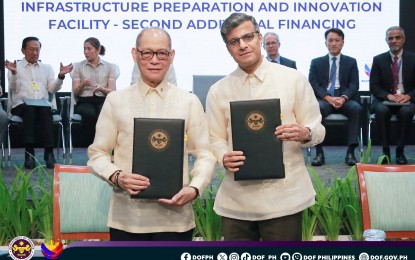
LOAN DEALS. Finance Secretary Benjamin Diokno (left) and Asian Development Bank Country Director for the Philippines Pavit Ramachandran seal the deal for two loan agreements on Friday (Dec. 15, 2023). These loan agreements are the first tranche of the financing for the Bataan-Cavite Interlink Bridge and the Infrastructure Preparation and Innovation Facility-Second Additional Financing. (Courtesy of DOF)
MANILA – The Philippine government, through the Department of Finance (DOF), and the Asian Development Bank (ADB) signed on Friday the first tranche of the financing for the Bataan-Cavite Interlink Bridge (BCIB) and the Infrastructure Preparation and Innovation Facility-Second Additional Financing (IPIF-AF2).
The signing of the two loan agreements was led by DOF Secretary Benjamin Diokno and ADB Country Director for the Philippines Pavit Ramachandran.
The first tranche of financing for the BCIB is worth USD650 million, which is part of the total USD2.1 billion loan for the entire project.
The projects will be financed under a multi-tranche financing facility, in which the succeeding tranches will be availed of in the duration of the project and are subject to securing relevant government approvals for each subsequent loan tranche.
The 32.15-kilometer bridge that will cross Manila Bay to connect the provinces of Bataan and Cavite would be the world’s longest marine bridge.
The project will cut travel time between Bataan and Cavite to 45 minutes from the current five-hour trip
It also aims to decongest Metro Manila as the two provinces will now be directly connected through this project, which is part of the Marcos administration’s Infrastructure Flagship Projects (IFPs).
“This improved transport connectivity will promote deeper regional economic integration and spur economic activity within NCR, Calabarzon, and Central Luzon,” Diokno said.
The BCIB will also use low-carbon technologies and construction materials.
The USD3.9-billion project will be co-financed by the ADB and the Beijing-based Asian Infrastructure Investment Bank, which will pour in USD1.14 billion.
The Philippine government will finance the remaining USD664.23 million.
The DOF and the ADB also sealed the loan deal for the USD200-million Infrastructure Preparation and Innovation Facility-Second Additional Financing (IPIF-AF2).
“The lPlF-AF2 aims to sustain increased investments in infrastructure by enhancing the capacity of implementing agencies in preparing and managing public infrastructure investments through improving the delivery of high-quality, inclusive, climate-resilient, and low-carbon infrastructure projects; and accelerating sustainable, resilient, integrated, inclusive, and modern critical infrastructure development,” the DOF said.
The additional financing from the ADB will expand the scope of the ongoing projects to respond to the government’s investment needs, which will include scaling up climate action.
The entire program costs USD229.8 million, with the remaining USD29.8 million being covered by the budget of the Department of Public Works and Highways and the Department of Transportation.
“These projects are a product of the continued strong cooperation between the ADB and the Philippine government. The synergy we have fostered with the Bank over the years has enabled us to continually produce inclusive and innovative projects such as the BCIB and the IPIF,” Diokno said.
ADB Vice President for East Asia, Southeast Asia, and the Pacific Scott Morris, on the other hand, assured the Philippine government of the ADB’s continued support by being “steadfast partner in infrastructure development, in economic reforms in enhancing competitiveness, and human development." (PNA)
